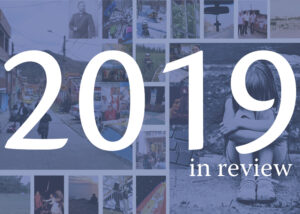Headline ‘diminishes and sensationalizes’ church article
Re: “Church ditches ‘overt religiosity’ to become ‘community resource,’ ” May 27, page 18.
We were delighted to connect with John Long-hurst when he expressed interest in writing an article about our recent Calgary Inter-Mennonite Church’s renovation project. We have been grateful for funding from a community foundation to create a community resource using our building. His article in Canadian Mennonite is articulate and captures well our story and the reasons why we took this initiative forward.
Unfortunately, the headline chosen for the article both diminishes and sensationalizes this initiative. We are disappointed that the team at CM would choose to assign a title of this nature to Longhurst’s article. In reviewing recent copies of CM, this seems out of character. It also feels that presenting our church work under this banner does nothing to build bridges between the Mennonite constituency and our faith community, a relationship that has often been difficult over the past decades.
We thought it important for you to be aware of our sentiments about this. Assigning a title of this nature is disheartening for our faith community as we seek to live out the gospel in ways that reflect peace and build connections.
—Bert Enns and Graham Neumann, Calgary
My encounter with Jean Vanier
Recently, I read the obituary for Jean Vanier and found myself transported back to London in the fall of 1989.
At the time, my husband had gone to England for an international conference, and I attended the final evening program followed by a presentation from Vanier, the keynote speaker.
Before the dinner, the conference organizers made a special effort to introduce the few of us who were fellow Canadians to him. I was immediately struck by his warmth and his open and unpretentious way of communicating, and I could not help noticing that, although his clothes were not quite threadbare, they had seen a lot of wear.
When he heard that we lived close to Toronto, he encouraged us to visit Daybreak in Richmond Hill, the first L’Arche community established in Canada. He also asked us to take greetings to Henri Nouwen, a Catholic priest and writer who had left a prestigious position as a professor at Harvard University in order to live a life of simplicity with the residents at Daybreak.
By the time we were called to dinner, he had adopted us as his Canadian companions for the evening. He was concerned about misplacing his bag—a small, brown and battered piece of luggage—and asked us to keep it with us.
I do not remember the specific words that he spoke in his keynote address, but I will always remember the powerful message that he shared: Every human being is precious and needs love, even those neglected, overlooked and despised. There was power in his words because of the life he lived. The audience knew that he helped to feed, wash and toilet his disabled housemates at L’Arche in France.
I have a file in my desk where I collect stories about people in our time who inspire me. Vanier and his words are in my inspiration file: “We are not called by God to do extraordinary things, but to do ordinary things with extraordinary love.”
—Joanna Reesor-McDowell, Stouffville, Ont.
Voting for a candidate who was ‘thrown under the bus’
Re: “Murky lessons from a political firestorm,” May 27, page 17.
Perhaps the lessons are not as murky as suggested. The implication that Jane Philpott and Jodi Wilson-Raybould possibly should have taken the moral low-road because “caucus solidarity is essential to our system of government” is part of the problem. Both women were summarily “thrown under the bus” and our family will be voting for Wilson-Raybould, who is now running as an Independent, again.
—Peter A Dueck, Vancouver
The author is a member of First United Mennonite Church in Vancouver.
European cathedrals have a lot to teach us in North America
Re: “The gift of ecumenism, “ May 13, page 11.
It was a delight to read this reflection by Pastor Mark Diller Harder. On numerous tours and service stints in Europe, my wife Mary and I have also visited and appreciated many of the historical sites of early Anabaptism mentioned by Diller Harder.
My delight in his article, however, was evoked by the “rich ecumenical encounters” he details in its second half. Many of us North American Mennonites have rejoiced in the wide spread of Anabaptism in the Third World, turning our backs on the continent of our origin, where we all too frequently think of the Christian churches—some Mennonite, but mostly others—as being more or less dead, and of their architectural monuments, such as the famous cathedrals, as merely being reminders of a dying Christian presence.
Central Europe has indeed undergone widespread secularization for some time. Now, however, as we in Canada experience a similar trend of secularization, with rapidly declining church membership and attendance, we, too, may increasingly need to learn how to be church in such a situation. European churches may offer us some good models.
Diller Harder’s article portrays wonderfully encouraging experiences of a Christian presence in a secularized European context. At one point, for example, he records: “The historic building was suddenly a vibrant present-day worshipping community and we were no longer tourists.”
I remember similar experiences in non-Mennonite settings in Europe. The ecumenical church scene in Europe is by no means dead. It can teach us much about the resilience of believers in our own increasingly secularized country. A greater ecumenical awareness and collaboration is one of these.
—Waldemar Janzen, Winnipeg
Where does MCC fit in the Mennonite world?
As a former Mennonite Central Committee (MCC) volunteer and an active Mennonite, it seems to me that we need to take a fresh look at the service we do as Mennonites and that we have been so famous for, for so long. Helping others is at the core of our Anabaptist interpretation of the priority given us by the words and acts of our leader, Jesus Christ.
I look at this subject in two categories: short-range emergencies and longer-range development programs.
Mennonite Disaster Service (MDS) is a good example of a successful model in the short-range-emergency category. The same thing for Mennonite Economic Development Associates (MEDA) in the longer-range-development category.
But what about MCC? It seems that its roots are in the short-range emergency category. North American Mennonites helped their brethren in Russia through a revolution and famine, and helped with post-Second World War cleanup in Europe. And in recent years, MCC has responded to emergency needs in other countries, including refugees from Venezuela and human needs resulting from conflict in the Congo, and thrift stores in North America.
What I see, as a businessman and outsider, is a lack of focus within MCC and a buildup of overhead expenses in administration. Perhaps it’s time to rethink MCC. Maybe what MCC is now doing would fit better into MDS or MEDA.
—Richard Penner, Saskatoon
Embrace the ‘week’
Re: “Between Pure and Mennonite Heritage Week,” June 10, page 2.
The recent motion in the House of Commons to designate the second week of September as Mennonite Heritage Week was intended to, in the words of MP Ed Fast, “re-emphasize for Canadians how fortunate we are to live in a country like this, where we celebrate that diversity, live with each other in peace and learn from each other.” It is notable that MPs from three political parties spoke in favour of this motion, and that the vote was almost unanimous.
However, some individuals within our Mennonite circles, highlighted in Virginia A. Hostetler’s recent editorial, have reacted with apprehension, citing Mennonite humility among other concerns.
At present, there are dozens of similar heritage days, weeks and months, recognizing groups from Indigenous Canadians to Sikhs and United Empire Loyalists. All of these groups see this as an opportunity for celebration, contemplation and education, focusing on the positive aspects of their cultures and their role in Canadian life.
Similarly, Mennonites have made a wide variety of positive impacts in Canada, and these contributions deserve to be recognized and celebrated in the wider context that Mennonite Heritage Week can provide. Mennonite Heritage Week can also be used to promote a broader understanding within Canadian society of the diverse, global and multi-ethnic nature of our denomination, rather than the traditional, narrow definition that some see as the focus of this motion.
While there will always be space for nuanced self-reflection, I would suggest that embracing Mennonite Heritage Week and accepting the opportunities it provides will be beneficial to Mennonites as well as Canadian society in general.
—Dolores Harms Penner, Waterloo, Ont.








Leave a Reply
You must be logged in to post a comment.